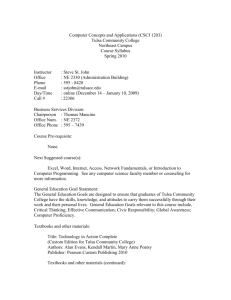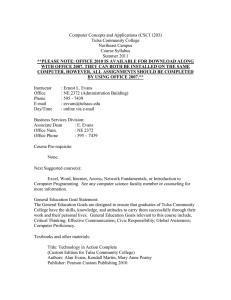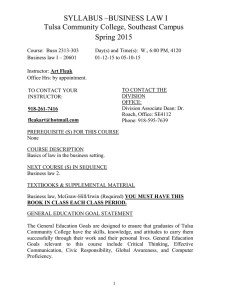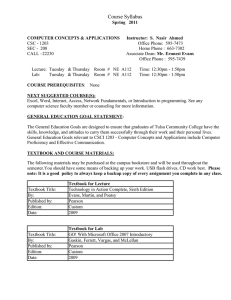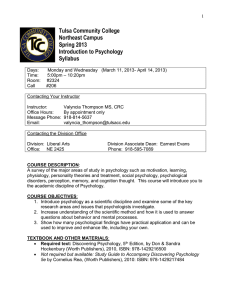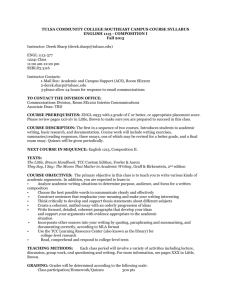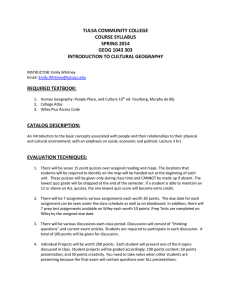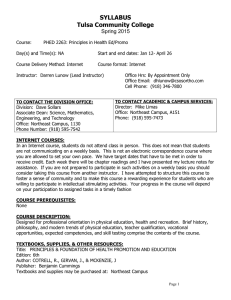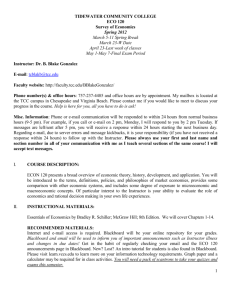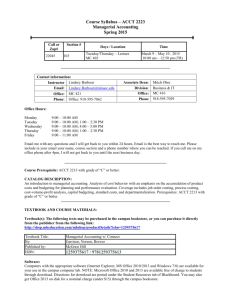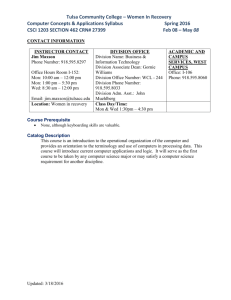CSCI_1203_209_13662_201110 (new
advertisement
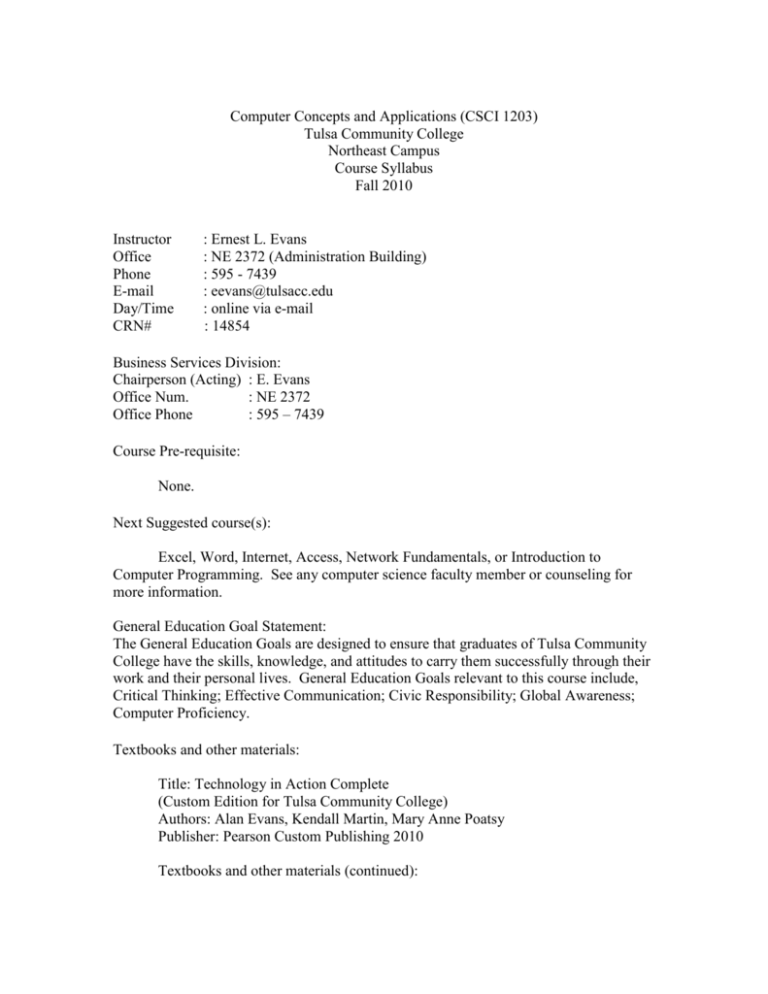
Computer Concepts and Applications (CSCI 1203) Tulsa Community College Northeast Campus Course Syllabus Fall 2010 Instructor Office Phone E-mail Day/Time CRN# : Ernest L. Evans : NE 2372 (Administration Building) : 595 - 7439 : eevans@tulsacc.edu : online via e-mail : 14854 Business Services Division: Chairperson (Acting) : E. Evans Office Num. : NE 2372 Office Phone : 595 – 7439 Course Pre-requisite: None. Next Suggested course(s): Excel, Word, Internet, Access, Network Fundamentals, or Introduction to Computer Programming. See any computer science faculty member or counseling for more information. General Education Goal Statement: The General Education Goals are designed to ensure that graduates of Tulsa Community College have the skills, knowledge, and attitudes to carry them successfully through their work and their personal lives. General Education Goals relevant to this course include, Critical Thinking; Effective Communication; Civic Responsibility; Global Awareness; Computer Proficiency. Textbooks and other materials: Title: Technology in Action Complete (Custom Edition for Tulsa Community College) Authors: Alan Evans, Kendall Martin, Mary Anne Poatsy Publisher: Pearson Custom Publishing 2010 Textbooks and other materials (continued): Title: GO! With Microsoft® Office 2007 (Custom Edition for Tulsa Community College) Authors: Shelley Gaskin, Robert Ferrett, Alicia Vargas, Carolyn McLellan Publisher: Pearson Custom Publishing 2010 (The text books are available bundled together at the TCC Northeast campus bookstore.) Secondary Storage Device Suggested: USB thumb drive Microsoft Office 2007 Microsoft Office 2007 must be used for all lab assignments. It is available for use in the FACET Center on the Northeast campus of Tulsa Community College during regular hours. It is also available for free download to Tulsa Community College students. Information on how to download Microsoft Office 2007 can be found under the Syllabus tab on Blackboard. In previous versions of Blackboard Firefox was the preferred browser. This has now changed! According to our latest information the preferred browser is Internet Explorer. Description: The terminology of computers is presented. A major focus will be the concept of “computer literacy”. The student will do several projects utilizing the major software features of Microsoft Office and the Internet. Catalog Description: This is a theory/applications course. The theory introduces the role of computers in all aspects of global society. The applications segment utilizes Microsoft Windows, Word, Excel, Access, Power Point and the Internet to equip students with basic computer skills necessary for their academic and professional careers. It will serve as the first course to be taken by any computer science major, may satisfy a computer science requirement for another discipline, a university parallel transferable course and meets the computer proficiency requirements mandated by the Oklahoma State Regents for Higher Education. Lecture 2 hours Laboratory 2 hours. Course Objective: The objective of this course is to give the student a basic exposure to the terminology of computers. Students will learn basic computer applications including: Windows, Word, Excel, Access, PowerPoint and Internet searches. Teaching Methods: Students will be expected to devote time each week to reading, online quizzes, and lab work. Evaluation and Grading Methods: 10 Quizzes (on Blackboard) 20 Lab Assignments (submitted through Blackboard) 10 Online Discussion Threads (on Blackboard) 2 Exams (on Blackboard)* Total Possible X X 10 points each 10 points each X 5 points each X 200 points each = 100 points = 200 points = 50 points = 400 points = 750 points Grading Scale: 90 % - 100 % A 675 - 750 80 % - 89 % B 600 - 674 70 % - 79 % C 525 - 599 60 % - 69 % D 450 - 524 0 % - 59% F 0 - 449 * For both the mid-term and final test I am going to allow you two attempts. Please do not waste this opportunity. Plan on scoring so well on the first exam that you do not need a second attempt! Participation Policy: Participation is the responsibility of the student. Students are expected to participate in a meaningful way each week of the semester. Make-up Policy: Lab assignments are due no later than the time and date posted on Blackboard. Late assignments will not be accepted. Make-up exams will not be given except in the most extreme circumstances. Any student requesting a make-up exam will be responsible for providing documentation supporting their request. If given, make-up exams will be worth 11% less than tests taken at the proper time. Withdrawal from the Class: Non-attendance does NOT constitute withdrawal from the class. Students must formally withdraw. The responsibility is yours! Notice: It is a violation of the law to create unauthorized duplicates of copyrighted microcomputer software. Tulsa Community College makes every effort to support these copyright agreements and does not support illegal duplication of copyrighted material. Students who are caught cheating, either on exams or copying assignments will receive a grade of F in the course. Institutional Statement Each student is responsible for being aware of the information contained in the TCC Catalog, TCC Student Handbook, TCC Student Code of Conduct Policy Handbook, and semester information listed in the Class Schedule. Transferability: Please visit with the TCC Counseling Center or the Counseling Center at the college or university to which you plan to transfer to determine transferability status of this course. ADA Policy: STUDENTS WITH SPECIAL NEEDS: Students with documented disabilities are provided academic accommodations through the disabled Student Resource Center (918595-7115) or Resource Center for the Deaf and Hard of Hearing (918-595-7428/TDDTTY 918-595-7434). If any student is in need of academic accommodations from either office, it is the student’s responsibility to advise the instructor so an appropriated referral can be made no later than the first week of class. Students may also contact the disabled Student Services Offices directly at the telephone numbers indicated. ACADEMIC ACCOMMODATIONS WILL NOT BE PROVIDED UNLESS APPROPRIATE DOCUMENTATIONS IS PROVIDED TO THE DISABLED STUDENT SERVICES OFFICES TO SUPPORT THE NEED. Plagiarism Policy: Plagiarism is claiming, indicating, or implying that the ideas, sentences, or words of another writer are your own; it includes having another writer do work claimed to be your own, copying the work of another and presenting it as your own, or following the work of another as a guide to ideas and expressions that are then presented as your own. The student should review the relevant sections of the TCC Student Code of Conduct Policy Handbook. Plagiarism will not be tolerated and may result in dismissal from the course. Academic Dishonesty or Misconduct: Academic dishonesty or misconduct is not condoned nor tolerated at campuses within the Tulsa Community College system. Academic dishonesty is behavior in which a deliberately fraudulent misrepresentation is employed in an attempt to gain underserved intellectual credit, either for oneself or for another. Academic misconduct is behavior that results in intellectual advantage obtained by violating specific standard, but without deliberate intent or use of fraudulent means. The student should review the relevant sections of the TCC Student Code of Conduct Policy Handbook. Computer Services Acceptable Use: Access to computing resources is a privilege granted to all TCC faculty, staff, and students. Use of TCC computing resources is limited to purposes related to the College’s mission of education, research, and community service. Student use of technology is governed by the Computer Services Acceptable Use Statements/Standards found in the TCC Student Code of Conduct Policy Handbook. These handbooks may be obtained by contacting any Student Activities or Dean of Student Services office.
